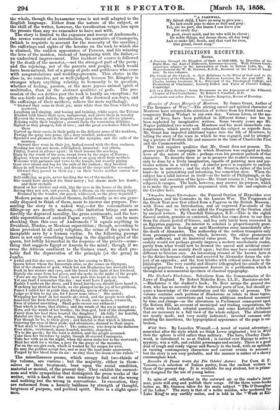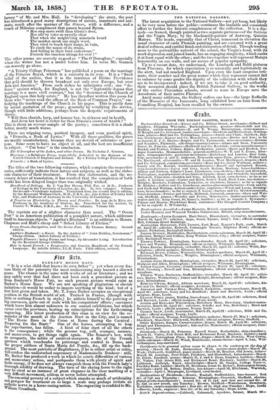PUBLICATIONS RECEIVED.
Boors.
A Journey through the Kingdom of Oude in 1849-1850, by Direction of the Eight Hon. the Earl of Dalhousie, Governor-General. With Private Corre- spondence relative to the Annexation of Oude to British India, Bee. By Major-General Sir W. H. Sleeman, K.C.B., Resident at the Court of Luck- now, In two volumes.
The Creeds of the Church, in their Relations to the Word of God and to the Conscience of the Christian. The Hulsean Lectures for the year 1857. By Charles Antony Swainson, ALA., Principal of the Theological College. and Prebendary of Chichester, formerly Fellow and Tutor of Christ's College, Cambridge. Life in a Risen Saviour : being Discourses on the Argument of the Fifteenth Chapter of FirstCorinthians. By Robert S. Candlish, D.D.
Andromeda and other Poems. By Charles Kingsley, Rector of Eversley.
_Memoirs of Tames Marquis of Montrose. By James Grant, Author of "The Romance of War."—The stirring career and spirited character of Montrose have attracted the attention of writers from his friend and con- temporary Bishop Wishart to our own day. Various Lives, or the ma- terial of lives, have been published in different forms ; nor has he been neglected by imaginative writers. Some twenty years ago Mr, Napier published two works on Montrose and his more immediate con- temporaries, which pretty well exhausted the subject as rekards facts. Mr. Grant has imported additional topics into the life of Montrose, by telling the story. of the wars in which he was engaged, and by attempt. ing a picture of Scottish life and manners in the time of Charles the First and the Commonwealth.
The task requires qualities that Mr. Grant does not possess. The greater part of the campaigns in which Montrose was engaged as leader were of the nature of raids ; perhaps even his greatest partook of that character. To describe these so as to preserve the reader's interest, can only be done by a lively imagination, capable of painting men and par- ticular actions in a vivid way. A similar power is requisite to embody
manners in narrative; the style of Mr. Grant is rather of the level kind—he is painstakig and informing, but somewhat slow. When the subject has a solid interest in itself—as the battle of Philiphangh, or the captivity and execution of the hero—Mr. Grant retains it ; but in lighter subjects it escapes. The book,' however, may answer its purpose, which is to make the general public acquainted with the life and exploits of the Cavalier hero.
ifirEptdou Aoyor Errpracjuov: the Funeral Oration of Hyperides over Leosthenes and his Comrades in the Lamian War. The Fragments of the Greek Text now first edited from a Papyrus in the British Museum; with Notes and an Introduction, and an engraved Fac-simile of th whole Papyrus : to which are added the Fragments of the Oration cited by ancient writers. By Churchill Babington, B.D.—This is the eighth funeral oration, genuine or contested, which has come down to our days from the classic period of Greece, and has only lately been recovered in an Egyptian papyrus. Its interest to scholars is proportionately great. Leosthenes fell in leading an anti-Macedonian army immediately after the death of A lerander. The authorship of the oration transpires only from presumptive evidence, which, however, the editor pronounces amply sufficient, and its historical value great. The splendour of the oratory would not perhaps greatly impress a modern unscholastic reader, partly from what would now be deemed the unreal and artificial consi- derations which are mainly dwelt upon ; but this may have sounded very different to Grecian ears. An interesting résumé of the known facts as to the divine honours claimed and received by Alexander forms the sub- ject of an appendix; and the text bristles with critical notes dear to the philologist. The very careful and illusive lithographed fac-simile of the original papyrus forms a prominent feature in a publication which is throughout a monumental specimen of classical typography.
The Student's Blackstone. Selections from the Commentaries of the Laws of England. By Robert Malcolm Kerr, LL.D., Barrister-at-law. —Blackstone is the student's book; Dr. Kerr means the general stu- dent, who has no necessity for the technical parts of law, but should ac- quire a knowledge of the constitution and the rights of persons. The volume contains such portions of Blackstone as relate to these topics, with the requisite corrections and various additions rendered necessary by time and change—as the alterations in Parliament consequent upon the Reform Bill, an account of municipal and trading corporations, the Union with Ireland, colonial questions, and some historical tribunals that are necessary to a full view of the whole subject. The alterations are neatly made, and very neatly indicated; inverted commas only marking the insertions, the typographical appearance of the page is un- broken..
Wild Oats. By Lascelles Wraxall.—A novel of varied adventure ;
somewhat after the style which we think Lever originated; in Wild the sphere is civil rather than military. The hero, harley Dash- wood, is introduced to us at Oxford ; is carried over Europe to solve a mystery, win a wife, and exhibit personages and society. There is a good deal of rough and ready vigour and fluency in the book, with an aptitude in turning contemporary characters and current events to account ; but the story is not very probable, and the manner is rather of a showy commonplace kind.
Baccolta di Poetic tratte dai Pies Celebri Autori. Per Cura di F. Venosta.—A selection of Italian poetry, from the earliest writers to those of the present day. It is available for any student, but is prima- rily designed for the use of young ladies.
In spite of cold, whether in the outward air or the reader's inner man, poets will sing and publish their songs. Of the three verse-books before us, Mr. Gannon takes for his main subject " The O'Donoghue of the Lakes." The story is that of a noble maiden, who preferred the Lake King: to any earthly suitor, and is told in the "Week at Ell-
ltusey " of Mr. and Mrs. Hall. In " developing " the story, the poet has introduced a good many descriptions of nature, inanimate and ani-
mate, much after the manner of the Giaour, with a difference, and a
touch of Milesian compliment that passes beyond Byron. " Her step more swift than Glena's deer, Her silv'ry voice so sweetly clear That when the neighb'ring minstrels heard The maiden speak one single word, They tried to teach their harps, in vain, To catch the music of its strain, And failing in their fond endeavour," Forsook the tuneless strings for ever I" The other poems are scarcely so good as " The O'Donoghue," especially when the writer has not a model before him. In verse Mr. Gannon can scarcely go alone.
"A Trinity College Prizeman" has published a poem on the marriage of the Princess Royal, which is a curiosity in its way. It is a "fixed belief of the author, that it is the intention of Divine Providence that gold should be thrown broadcast not only over Europe, but over Asia and America." From such riches he anticipates evil ; one " de- fence" against which, for England, is not the "deplorable dogma that marriage is a mere civil contract," but the " doctrines of the Church of England upon this holy estate." He has therefore written this poem for those who " never read the offices of the Book of Common Prayer," em- bodying the teachings of the Church in his pages. This is partly done by actual quotation of the prose ; generally by versifying the service, though with little additions, perhaps from the despotic requirements of rhyme. " Wilt thou cherish, keep, and honour her, in sickness and in health,
And deem her heart is richer far than Prussia's crown of wealth ? " This is about an average sample of the poetry ; sometimes it is a shade better, mostly much worse.
There are tripping verse, poetical imagery, and even poetical spirit, in "Primula, a Book of Lyrics." With all these qualities, the pieces are mostly unsatisfactory, because they are devoid of substance or pur- pose. Some seem to have no object at all, and the best are insufficient in subject. " Cui bono " is the conclusion.
The O'Donoghue of the Lakes, and other Poems. By Nicholas J. Gannon. Marriage : a Religious Poem, respectfully dedicated to the Bishops of the United Church of England and Ireland. By a Trinity College Prizeman. Primula : a Book of Lyrics.
The titles of the two following volumes, which complete the respective series, sufficiently indicate their nature and subjects, as well as the elabo- rate character of their treatment. From this elaboration, and the ne- cessary delays of translation, it has resulted that the completion of both works has been delayed longer than was originally wished.
Handbook of ZoMogy. By J. Van Der Hoven, Phil. Nat. et M.D., Professor of Zoology in the University of Leyden, &c. &c. In two volumes. Volume the Second-Vertebrate Animals. Translated from the second Dutch edition, by the Reverend William Clark, M.D., F.R.S., &c., late Fellow of Trinity Col- lege, and Professor of Anatomy in the University of Cambridge.
A Treatise on Electricity, in Theory and Practice. By Aug. de la Rive, ex- Professor in the Academy of Geneva, &c. Translated for the Author, by Charles V. Walker, F.R.S., &c. In three volumes. Volume III.
The reprints are of a slighter character than usual. The " Ocean Post" is an American publication of a pamphlet nature, which addresses itself to American objects. "Agatha's Husband " is an addition to Messrs. Chapman and Hall's cheap and " Select Library of Fiction."
Ocean Steam-Navigation and the Ocean Post. By Thomas Rainey. Second edition.
Agatha's Husband : a Novel. By the Author of " John Halifax, Gentleman." Cheap edition. (Select Library of Fiction.) Wayside Flowers: being Poems and Songs, by Alexander Laing. Introduction by the Reverend George Gilfillan.
How to Speak French : a Progressive and Concise Handbook of the French Language. By Achille Albites, LL.B. Paris. Fifth edition, revised.



























 Previous page
Previous page